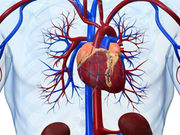Achieving NP predischarge thresholds cuts mortality, readmission in acute decompensated heart failure
TUESDAY, Nov. 29, 2016 (HealthDay News) — For patients hospitalized with acute decompensated heart failure (ADHF), achieving predischarge natriuretic peptide (NP) thresholds is associated with reduced mortality and readmission, according to a review published online Nov. 29 in the Annals of Internal Medicine.
Casey N. McQuade, M.D., from the University of Pennsylvania in Philadelphia, and colleagues conducted a systematic review to examine the correlation between achieving predischarge NP thresholds and mortality and readmission in adults with ADHF. Data were included from one randomized trial, three quasi-experimental studies, and 40 observational studies. The most commonly used thresholds were a brain-type NP (BNP) level of 250 pg/mL or less or an amino-terminal pro-brain-type NP (NT-proBNP) decrease of 30 percent or more.
The researchers found that achievement of absolute BNP thresholds correlated with a reduction in post-discharge all-cause mortality and in the composite of mortality and readmission. Achievement of percentage-change BNP thresholds correlated with reductions in the composite outcome; achievement of percentage-change NT-proBNP thresholds correlated with reductions in all-cause and cardiovascular mortality, and in the composite outcome. The randomized trial, which had a high risk of bias, indicated that a predischarge decrease in NT-proBNP level correlated with lower risk of the composite outcome.
“Low-strength evidence suggests an association between achieving NP predischarge thresholds and reduced ADHF mortality and readmission,” the authors write.
One author disclosed financial ties to the medical device and technology industries.
Full Text (subscription or payment may be required)
Editorial (subscription or payment may be required)
Copyright © 2016 HealthDay. All rights reserved.








